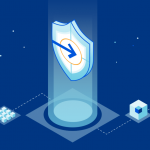Inside Quantum Technology’s “Inside Scoop:” Quantum and Cryptocurrency

The cryptocurrency industry has multiple levels, from DeFi (decentralized finance) to NFTs (non-fungible tokens). Though the industry doesn’t seem as much of a fad recently, it continues to grow and expand these multiple levels. Quantum computing could benefit this industry significantly, creating more paradigm shifts in the future. According to Charles Hoskinson, CEO and Founder of Input Output Global Inc. (formerly IOHK), a blockchain engineering company, “I don’t feel that quantum computers have a pervasive negative impact on cryptocurrencies, but instead, they can add a lot more utility.” While these two innovative technologies could synchronize successfully, their coming together could be more of a head-on collision than a collaboration.
The Benefits of Quantum Computing for Cryptocurrency
Hoskinson is no stranger to innovative technology. Before becoming CEO, Hoskinson founded three cryptocurrency-related start-ups – Invictus Innovations, Ethereum, and IOHK. He was also the founding chairman of the Bitcoin Foundation’s education committee and established the Cryptocurrency Research Group in 2013. Given his expertise in cryptocurrency, Hoskinson sees many opportunities for quantum computing to benefit this industry. “Quantum number generation for truly random numbers could help with a proof of security,” he mentioned. As cryptocurrency runs on blockchain systems, it relies on random number generators to control the amount of currency in the digital system. These random numbers also help in blockchain storage, where they can help the blocks be more secure from hacking. “What’s so exciting to me is when a new capability comes out, most people aren’t sure how to use it,” Hoskinson added. “But it’s a very complimentary thing and a very exciting thing. And it will provide new ways of thinking about data storage and compression. And all of those will eventually become components that we take for granted in the classical sense in the classical blockchain world, so I see it long term after we resolve the adversarial components as a value add to the industry.”
Hoskinson also explained a process that his company and researchers at Princeton University are developing called a “one-shot” signature. This “one-shot” signature process allows digital signatures only to be used once, boosting digital security. “If you signed something, it would only be used one,” Hoskinson added. “It’s similar to Mission Impossible, where this thing will self-destruct in 10 seconds, that kind of a thing.” Hoskinson sees this process as especially helpful for digital ownership, such as in NFTs and similar items. Because quantum computing promises to process things more optimally, Hoskinson believes that the “one-shot” signature would be best used on a quantum computer.
Could Quantum Computing Be Cryptocurrency’s End?
When studying cryptocurrency, Hoskinson also looks at ways it can be threatened, many of which involve a quantum computer. “The problem there is that the things that we assumed would take the universe’s lifespan could potentially be broken in minutes, hours, or days,” he said. “And that translates to the ability to steal money, change history, all kinds of stuff.” To avoid this problem, Hoskinson has been looking at various post-quantum cryptographic algorithms that the National Institute of Standards and Technology (NIST) has recently approved. While these algorithms are still being tested and developed, Hoskinson hopes that they can be used to make blockchain systems like cryptocurrency more secure. “Getting quantum to work is already a gargantuanly difficult engineering problem.” He said. “But there are strong incentives for people to do this, and they’re doing amazing work.”
Kenna Hughes-Castleberry is a staff writer at Inside Quantum Technology and the Science Communicator at JILA (a partnership between the University of Colorado Boulder and NIST). Her writing beats include deep tech, the metaverse, and quantum technology.























